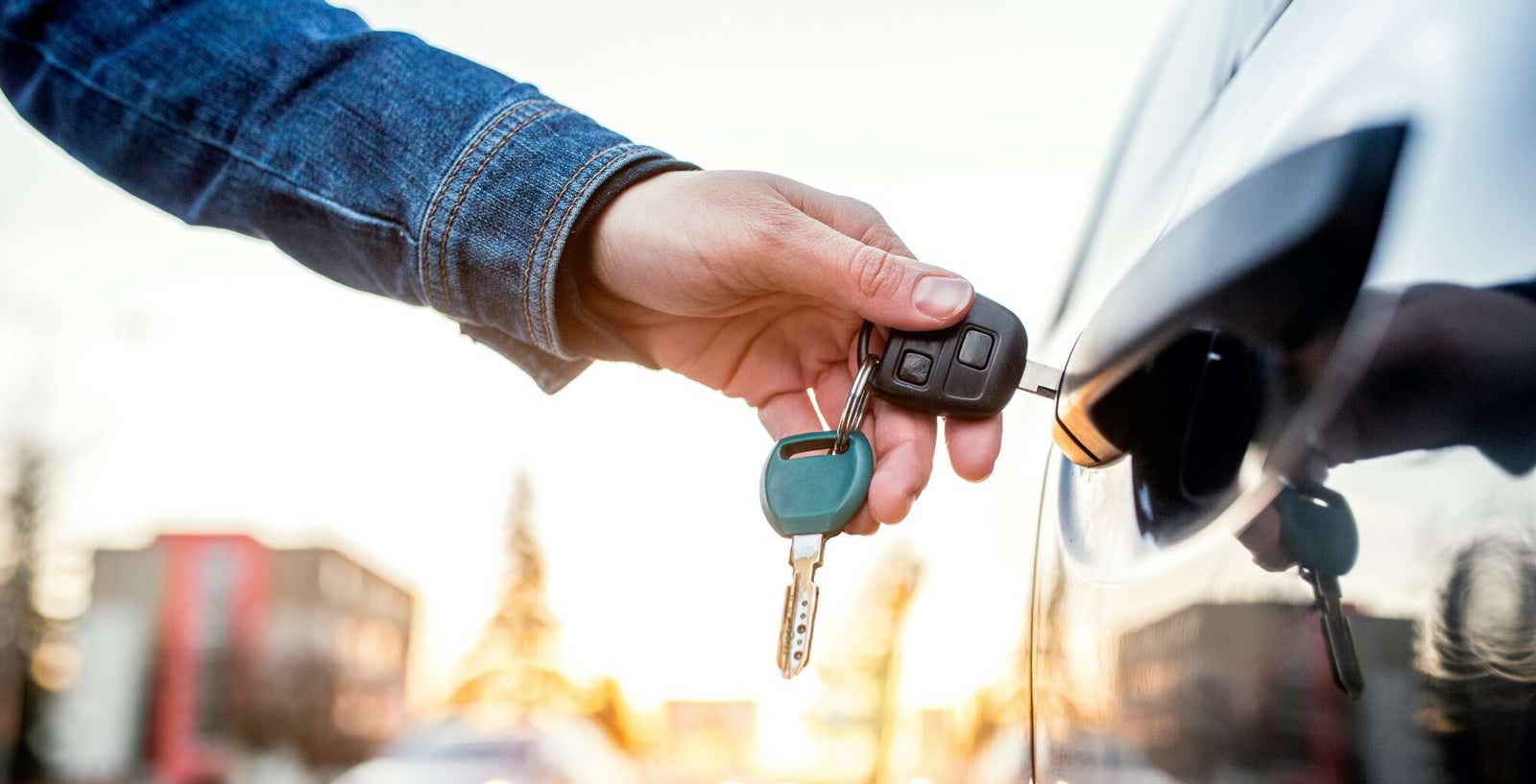1. Choose your car carefully
The car you drive is one of the key factors insurers focus on when setting premiums. A large, powerful model will cost more to insure than a basic, inexpensive runaround.
While we’d all like to drive an impressive model, you could end up paying through the nose for the privilege. The classier your car is, the more it’ll stand out and attract thieves and vandals.
Expensive cars cost more to repair, which explains why they are so expensive to insure. Also, they are quicker and more powerful, which means they tend to be in more expensive accidents.
Before you buy a car, whether on finance or not, check what it’ll cost to insure first compared to a smaller, less powerful model.
2. Keep your car safe
Insurers will offer you a more affordable premium if you do your best to keep your car out of harm’s way. If possible, keep your car in a secure garage or driveway overnight, rather than on the road where it is in easy reach of thieves and vandals.
3. Drive fewer miles
Car insurance premiums are usually more affordable for those who drive fewer miles — the more you drive, the greater the chance of having an accident.
How does driving to work affect my insurance premium?
If you use your car to commute to work your premium will be higher, as you are more likely to be driving often and at peak times, and the probability increases of you making make a claim.
4. Install security features
You can reduce your premium further by installing additional security features, such as a tracker. If you need to park on the road, do so in a well lit area as thieves and vandals are less likely to target your car if they are in the spotlight.
5. Pick the right level of cover
To drive on UK roads you must have car insurance, of which there are three levels:
Comprehensive: the highest level of cover, comprehensive car insurance protects you, your car, other people, and their property, including their vehicle in the event of an accident
Third party, fire and theft: this won’t protect you or your car if it’s involved in an accident that you’re responsible for. But it will cover fire damage, theft or attempted theft. It will protect passengers in your car, if they are injured, plus other people and their property if they are in an accident with you for which you’re held responsible.
Third party: the minimum level of cover legally required to drive in the UK. This policy covers you for damage to other cars and property, as well as injuries to other people. But you will not be able to claim for any damage to your own car or person.
Although third party cover offers the least protection it isn’t necessarily the cheapest option. Always run quotes for this and comprehensive cover. This is because the profile of people selecting third party tends to be younger drivers, who lodge more claims, and those with older cars who don’t care too much if it’s damaged.
6. Consider black box insurance
Black box policies (also known as telematics, or pay as you drive policies) are another great way to save. As part of a black box policy, your insurer will install a small GPS-enabled device in your car or require you to download a smartphone app that monitors your driving.
The telematics device encourages safer driving and also makes the car easier to trace if it’s stolen. The insurer uses data collected from the black box, to set your premium. This data reveals the quality of your driving, such as how fast you’re travelling, how sharply you brake and what time of the day, or night, you’re driving. The more careful you are over time, the lower your premiums will be.
7. Think carefully about your job title
While you must be truthful when describing your job title, it’s well known that certain jobs are considered by insurers as riskier than others.
Take the catering industry, for example, you could be a cook or a chef, no difference perhaps, but one description could add pounds to your premium. Never be misleading when getting quotes, but do think about how you can describe your role.
8. Add a named driver
You may consider yourself a safe driver, but insurers will group you into a high-risk category if you have recently passed your test, are under the age of 25, or have previous claims or convictions.
If you are in one of these groups, you may be able to reduce the cost of your quote by adding a responsible and experienced named driver to your policy if they are likely to use the car.
9. Protect your no-claims bonus
For every year you drive without making a claim on your insurance, you will earn a no-claims bonus. A maximum no-claims bonus, typically from around eight years can result in savings of up to 80% on your insurance costs.
There’s no way to speed up this process, but you can improve your chance of getting cheaper car insurance in the future by protecting your no-claims bonus for an additional fee. With this added extra, which will cost a small additional premium, you won’t lose your no-claims bonus – although your premium may still rise.
10. Pay upfront for car insurance
Paying upfront for your car insurance can be a big hit to your bank balance, but it can save you a considerable amount over the year. By paying for your car insurance in monthly instalments, you are essentially taking out a loan from the insurer with added interest rates.
If you can afford to pay the annual cost upfront, you could save 20% or even more depending on your provider.
11. Compare quotes
One of the best ways to save on your car insurance is to shop around and compare insurers. Even if you’re happy with your current insurer, it’s likely you’ll save on your renewal cost by comparing quotes from other providers.
Remember there are alternatives to the big-name providers — a specialist insurer may be able to give you a better deal if you’re in a high-risk group or have a powerful or modified car.
12. Check your mileage is correct
Most people estimate their mileage when getting a car insurance quote, so make sure you’re providing an accurate prediction. Your MOT certificates will show mileage from previous years, or you could track your weekly usage and use this to estimate your annual mileage.
Make sure you don’t lie about your mileage just to get cheaper car insurance — if you have to make a claim and your mileage doesn’t match up, your insurer may not pay out.
13. Never auto-renew
One of the best ways to find cheaper car insurance is by shopping around and comparing prices when it comes to renewal. Always check the price your insurer is quoting you with what others will charge you.
If you find a cheaper price elsewhere, you're free to switch. Or you could go back to your insurer and ask it to match or lower the price.
14. Cut back on extras you're not using
Take a look at your policy and check that if you're paying for extras, such as windscreen cover or European cover, you're actually using them. If not, it may be cheaper to get rid of these extras and it's at least worth checking if you can find them cheaper elsewhere.
15. Increase your voluntary excess
An easy win when you're looking for cheaper car insurance is to increase your voluntary excess. This is the amount of money you pay if you need to make a claim. It should lower your monthly premiums but just be aware that you will need to pay it if you do make a claim.
16. Consider an advanced driving course
Signing up for an advanced driving course, such as Pass Plus, is a good way to improve your driving and it could lower your insurance costs. While there's no guarantee your premiums will go down, passing the course should lower your overall risk of making a claim and you might get a discount on your insurance.
17. Watch out for admin charges
Insurers are technically allowed to charge administration charges for things like name and address changes or if they need to conduct a new risk assessment.
However, these need to be fair and reflective of any work done. If you don't think they are, you can complain to your insurer and ask it to refund you. If it disagrees, you can escalate the complaint to the free Financial Ombudsman Service after eight weeks has passed.
18. Choose modifications wisely
Some modifications such as those which enhance your car's security could cut the cost of your insurance. But others such as tinted windows may increase it. Always check with your insurer what the impact of any modifications will be before you have them fitted.
19. Compare the cost of pay-as-you-go insurance
If you don't drive regularly, it may be cheaper for you to choose pay-as-you-go insurance whereby you pay only when you use your car. this is designed for people who don't drive often but it's worth comparing the costs with an annual policy to see if it might be a cheaper option.
20. Take advantage of discounts and freebies
There are lots of discounts available for car insurance such as multi-car discounts or discounts if you have a few products with on insurer. It's well worth keeping an eye out for these as they could lower your insurance costs.
Get a car insurance quote
See a range of car insurance quotes in just a few minutes when you compare with Uswitch
FAQs
Which drivers pay the most for their car insurance?
Young drivers pay the most for car insurance because they are statistically more likely to have an accident and make an insurance claim.
What are the cheapest car insurance groups?
The cheapest car insurance groups are those that are the lowest. Cars that are in higher groups, such as those from 40 to 50, will be the most expensive to insure.
Is it cheaper to insure an electric car?
Electric cars are becoming more common and therefore the costs of insurance are coming down, yet costs have typically been higher because it's more expensive to replace or repair an electric car.
Why is my car insurance so high when I have a clean record?
Car insurance is priced by looking at a variety of different things, from your postcode and profession to your car and how you use it. Therefore even if you have a clean record you could be charged a high price for insurance because you are seen as a high risk to an insurer.


